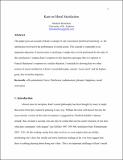Kant on moral satisfaction
Abstract
This paper gives an account of Kant’s concept of self-contentment [Selbstzufriedenheit], i.e. the satisfaction involved in the performance of moral action. This concept is vulnerable to an important objection: if moral action is satisfying, it might only ever be performed for the sake of this satisfaction. I explain Kant’s response to this objection and argue that it is superior to Francis Hutcheson’s response to a similar objection. I conclude by showing that two other notions of moral satisfaction in Kant’s moral philosophy, namely ‘sweet merit’ and the highest good, also avoid the objection.
Citation
Walschots , M 2017 , ' Kant on moral satisfaction ' , Kantian Review , vol. 22 , no. 2 , pp. 281-303 . https://doi.org/10.1017/S136941541700005X
Publication
Kantian Review
Status
Peer reviewed
ISSN
1369-4154Type
Journal article
Description
The author thanks the Social Science and Humanities Research Council of Canada, the German Academic Exchange Service, as well as the Interdisciplinary Centre for European Enlightenment Studies in Halle for their generous financial support that made research on this paper possible.Collections
Items in the St Andrews Research Repository are protected by copyright, with all rights reserved, unless otherwise indicated.

